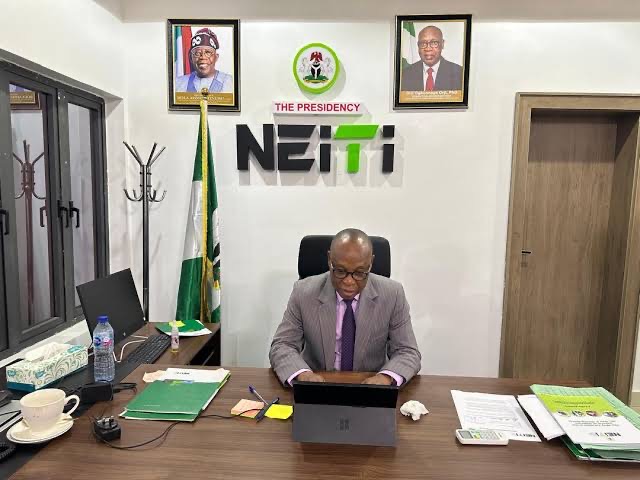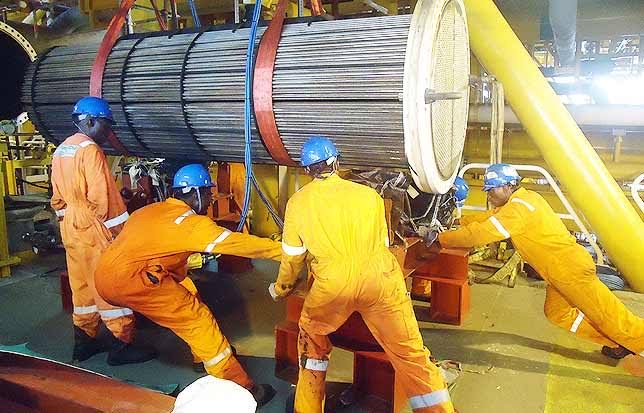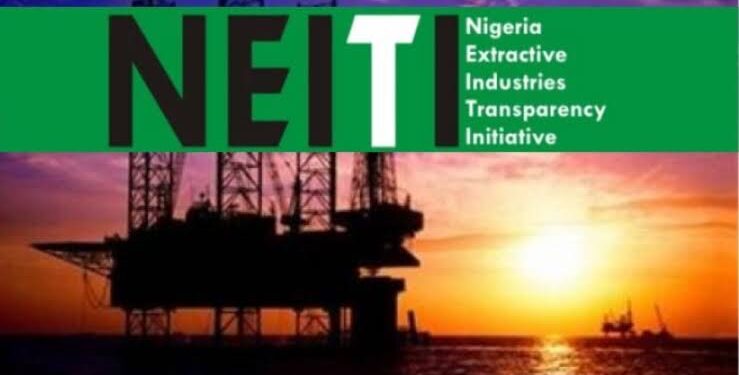The Nigeria Extractive Industries Transparency Initiative (NEITI) has reported that the outstanding revenues owed to the federal government from the oil and gas sector have significantly increased, totaling a staggering $6.071 billion and ₦66.4 billion as of June 2024.
This critical disclosure was made in NEITI’s newly released ‘2022/2023 Independent Oil and Gas Industry Report,’ which was officially presented in Abuja on Thursday.
In this comprehensive report, NEITI broke down the debt structure, explaining that the outstanding liabilities include $6.049 billion and ₦65.9 billion in unpaid royalties and gas flare penalties owed to the Nigerian Upstream Petroleum Regulatory Commission (NUPRC) as of August 31, 2024.

These penalties have accumulated due to non-compliance by oil and gas companies with regulatory standards related to gas flaring and royalty payments, signaling ongoing challenges in revenue collection and regulatory enforcement in Nigeria’s upstream oil sector.
Furthermore, NEITI detailed additional unpaid taxes, including petroleum profit taxes, company income taxes, withholding taxes, and value-added taxes (VAT), which amount to $21.9 million and ₦492.8 million. These outstanding taxes are owed to the Federal Inland Revenue Service (FIRS) as of June 2024, further contributing to the federal government’s financial burden.
Among other significant findings in the report, NEITI highlighted a major reduction in petrol importation during the 2023 fiscal year. According to the data, the volume of imported petrol dropped from 23.54 billion liters in 2022 to 20.28 billion liters in 2023, underscoring a shift in the country’s fuel import dynamics.
This decline could be attributed to various factors, including domestic economic conditions, changes in government policies, or improvements in local refining capacities, although the report did not specify the precise causes.
In another important section of the report, NEITI revealed that from 2006 to 2023, ₦15.87 trillion was claimed as under-recovery costs—essentially price differentials—due to the regulated pricing system for petrol. These price differentials arise from the gap between the actual cost of fuel importation and the regulated retail prices.
The most significant amount, ₦4.71 trillion, was recorded in 2022 alone, highlighting the immense financial pressure that Nigeria’s fuel subsidy regime has placed on the government’s finances over the years.
When addressing crude oil production, NEITI provided a detailed analysis of Nigeria’s output trends. The report noted that fiscalized crude production, which refers to the volume of oil officially recorded and taxed, stood at 490.945 million barrels in 2022.

This represents a sharp 11% decline compared to the 556.130 million barrels produced in 2021. However, there was a noticeable recovery in 2023, with total fiscalized production rising to 537.571 million barrels, marking an increase of 46.626 million barrels, or 9.5%, from the previous year.
NEITI’s report also reviewed a 10-year trend (2014–2023) in crude oil production. The data revealed that Nigeria’s highest production volume was recorded in 2014, with 798.542 million barrels produced, while the lowest production was observed in 2022, with 490.945 million barrels.
These fluctuations underscore the challenges faced by the Nigerian oil sector, including operational disruptions, infrastructural deficiencies, and regulatory issues, which have affected production volumes over the years.
The report also provided insights into crude oil lifting, a term used to describe the quantity of oil exported from Nigeria. According to NEITI’s data, 534.159 million barrels of crude oil were lifted in 2023, which is an improvement from the 482.07 million barrels lifted in 2022.
However, this figure remains below the 551 million barrels lifted in 2021, suggesting that while there has been progress, the sector has not yet fully recovered from previous production setbacks.
Another key area of focus in NEITI’s report was oil theft and crude losses. The report indicated that Nigeria experienced a significant reduction in oil theft and crude losses in 2023.
A total of 7.68 million barrels of crude oil were either stolen or lost during the year, representing a dramatic 79% reduction from the 36.69 million barrels lost or stolen in 2022.
This marked improvement can be attributed to enhanced security measures, stricter enforcement, and perhaps better monitoring of oil pipelines and infrastructure, although the report did not detail the specific interventions that led to this decrease.
On the subject of overall revenue generation within the oil and gas industry, NEITI provided a detailed breakdown of the contributions from different companies.
The report showed that material companies, which are the larger entities within the industry, accounted for $15.549 billion, or 96%, of the total revenues generated in 2022. Meanwhile, non-material companies contributed $695.604 million, or 4%, to the revenue.
In 2023, material companies saw their contributions rise to $21.415 billion, making up 95% of the total revenues, while non-material companies accounted for $1.238 billion, or 5%. These revenues were derived from 17 identified revenue streams, including taxes, oil and gas sales, dividends from the Nigerian Liquefied Natural Gas (NLNG), royalty payments, signature bonuses, gas flare penalties, and concession fees.
During the presentation of the report in Abuja, NEITI’s Executive Secretary, Ogbonnaya Orji, emphasized the importance of the report as a tool for policy formulation and public discourse. “The report remains a vital tool for identifying leakages, improving revenue collection, and promoting resource management reforms,” Orji said.
He added that the report serves as “an authoritative document that provides comprehensive data and information on revenues, governance structures, operations, and compliance within the oil and gas sector for the 2022/2023 period.”
At the event, George Akume, the Secretary to the Government of the Federation (SGF) and Chairman of the NEITI Board, reaffirmed the federal government’s commitment to supporting NEITI’s principles and the broader goals of transparency and accountability in the management of Nigeria’s natural resources.
“We consider the EITI not only as a global standard for promoting transparency in the management of revenues from natural resources but also as a tool to strengthen public trust, accountability, and economic growth,” Akume said. He assured attendees that the government would carefully study the report and take the necessary steps to ensure its effective implementation.
Also speaking at the event, the Chairman of the Economic and Financial Crimes Commission (EFCC), Ola Olukoyede, reiterated the significance of NEITI’s findings in the fight against corruption. He pledged that the EFCC would thoroughly investigate and recover all outstanding debts owed to the government as highlighted in the report.
“Where NEITI’s work stops, EFCC’s begins,” Olukoyede stated, emphasizing that the EFCC will pursue companies identified in the report to ensure full accountability. He further noted that NEITI’s reports have been instrumental in recovering public funds, stating, “This demonstrates the effectiveness of NEITI’s reports in recovering public funds and promoting accountability.”
Olukoyede also disclosed that as of Wednesday, over ₦1 billion had already been approved for remittance to the federation account following investigations spurred by NEITI’s previous report.
He added that ongoing investigations were continuing, with more recovered funds expected to be deposited into the federation account in the near future.
Meanwhile, it was revealed that the Extractive Industries Transparency Initiative (EITI) had previously warned in November 2023 that Nigeria could face suspension from the initiative if it fails to meet the requirements for validation, which are set to commence on January 1, 2026.
In response, NEITI announced in April 2024 that it had developed a corrective action plan aimed at addressing the issues raised in its validation report by the EITI, signaling Nigeria’s commitment to maintaining transparency and accountability in the management of its extractive industries.

































